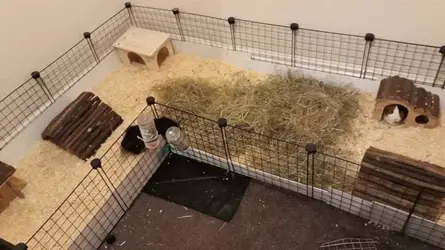TheWillowPigs
Junior Guinea Pig
Hey guys,
I wasn't really sure which section of the forum to put this in as it probably comes under several sections but I really need some advice.
I am a pigmom to 5 amazing guinea pigs who I love with all my heart. They have lived here at uni with me due to the genorosity of our landlord allowing guinea pigs in our accomodation. Another of my housemates has 4 guinea pigs, yet due to her moving out next year into accomodation that cannot take guinea pigs - I have offered to take her 4 on.
She has three girls and a neuteured boar. One of the girls is very prone to bladderstones, and is currently on medication after I noticed blood in her pee and informed her owner she should take her to the vet.
As the pigs currently aren't mine, I am a bit limited in what I can do right now, but I want to prepare for the future with these pigs. I'm hoping to introduce them to my 5 (all girls) to form a herd of 9.
Are there any pellets suitable for pigs prone to bladderstones? Any that don't contain calcium at all? At first I planned to feed her seperately to the others, but then it occured to me to see whether there was any pellets that I could safely feed all 9 of them.
Also, is there anything else I can to reduce the risk of her getting another bladderstone in the future? I'm not sure when I will get ownership of my housemate's 4, but I want to be prepared for when I do.
The thought of letting someone else have them was just too hard to bear. It'll cause some difficulties with moving later this year but my pigs are my world and I just couldn't let them go!
Any advice would be very gratefully recieved!
I wasn't really sure which section of the forum to put this in as it probably comes under several sections but I really need some advice.
I am a pigmom to 5 amazing guinea pigs who I love with all my heart. They have lived here at uni with me due to the genorosity of our landlord allowing guinea pigs in our accomodation. Another of my housemates has 4 guinea pigs, yet due to her moving out next year into accomodation that cannot take guinea pigs - I have offered to take her 4 on.
She has three girls and a neuteured boar. One of the girls is very prone to bladderstones, and is currently on medication after I noticed blood in her pee and informed her owner she should take her to the vet.
As the pigs currently aren't mine, I am a bit limited in what I can do right now, but I want to prepare for the future with these pigs. I'm hoping to introduce them to my 5 (all girls) to form a herd of 9.
Are there any pellets suitable for pigs prone to bladderstones? Any that don't contain calcium at all? At first I planned to feed her seperately to the others, but then it occured to me to see whether there was any pellets that I could safely feed all 9 of them.
Also, is there anything else I can to reduce the risk of her getting another bladderstone in the future? I'm not sure when I will get ownership of my housemate's 4, but I want to be prepared for when I do.
The thought of letting someone else have them was just too hard to bear. It'll cause some difficulties with moving later this year but my pigs are my world and I just couldn't let them go!
Any advice would be very gratefully recieved!

